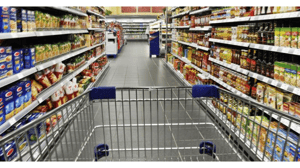Study: Negative customer experiences cost food retailers billions per year
“The importance of getting it right every time is crucial,” said Doug Sutton, president at Steritech, the data company that conducted the study.
January 12, 2023

Americans value certain features when it comes to their grocery shopping experience: food quality, price, product availability and customer service are the most valued. Mobile ordering, bathroom cleanliness and store design are also of value, though not as much, according to a recent study conducted by Steritech, a data and consulting services company.
And, customers’ expectations of things they value at the stores they visit often, as well as how they react when expectations are not met, can have a profound effect on retailers’ bottom line, according to Steritech’s new survey of 3,000 Americans. Although consumers are more likely to respond to a positive experience, lackluster in-store experiences and negative online reviews could potentially cost businesses upwards of more than $200 billion every year, the survey found.
“This study highlights the value of a positive interaction in a store which could lead to a happy customer and a supportive online review or social post that benefits the business, but the opposite can cause damage too, so the importance of getting it right every time is crucial,” said Doug Sutton, president at Steritech, in a statement.
Twenty-nine percent of consumers are more likely to post an online review about a positive experience, while 23% of consumers will post a negative experience, according to the study, and one in four consumers will visit a brand less frequently after one bad experience, versus 59% who will visit a location more frequently after a positive experience. If consumers have a positive experience, 19% said they will post it on social media; while 15% said they will post a negative experience on social media.
This data further shows that the shopping experience and review of it by consumers is significant for businesses because more than half (52%) of those surveyed believe online reviews give an accurate representation of an establishment, and 41% actually check online reviews or ratings before even visiting a location.
“Consumer experiences over the past few years have shifted as a result of world events, and with that comes the expectation of a seamless and consistent customer experience supported by strong brand values,” said Sutton.
Of the Americans surveyed, food quality was ranked the highest among them on the most-valued grocery store feature list at 60%, followed by value at 57%, product availability at 56%, customer service/staff disposition at 40% and store appearance at 35%.
Ranked lower were: food taste at 25%, physical safety at 25%, store design/organization at 22%, bathroom cleanliness at 13% and app/mobile ordering at 10%.
Consumers were also surveyed regarding consistency. It was noted that 74% of consumers feel that an establishment’s employees are a reflection of that brand’s values, and 74% said that they expect a brand to provide the same experience from one store to the next. Regarding third-party delivery services, more than half (55%) blame orders gone wrong on the establishment they ordered from, while 28% fault the delivery service.
About the Author
You May Also Like




